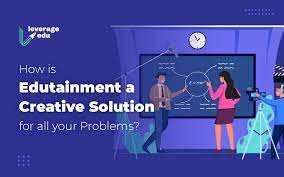In a world where information is constantly at our fingertips, the line between education and entertainment is blurring more than ever before. This phenomenon is aptly termed “edutainment,” a fusion of education and entertainment. In this article, we explore the fascinating realm of edutainment and delve into its myriad benefits. Buckle up, as we embark on an enlightening journey through the world of learning that doesn’t feel like learning.
What Is Edutainment?
Edutainment, a portmanteau of “education” and “entertainment,” is a versatile concept that encompasses a wide array of media and activities designed to educate while simultaneously engaging and entertaining the audience. It’s a clever strategy that incorporates elements of fun, excitement, and engagement into learning experiences. Edutainment can be found in various forms, such as TV shows, video games, interactive exhibits, and even board games.
The Evolution of Edutainment
Over the years, edutainment has evolved significantly, adapting to the changing needs and preferences of its audience. It’s no longer limited to traditional classroom settings or dull textbooks. Today, it thrives in the digital age, where access to information is more accessible than ever.
The digital revolution has given rise to a multitude of edutainment platforms, from educational YouTube channels to interactive mobile apps. With the internet as a global classroom, learning has never been more engaging. We’ve come a long way from static, one-size-fits-all learning methods to a dynamic, personalized, and interactive learning experience.
The Benefits of Edutainment
1. Engages and Captivates
One of the most significant advantages of edutainment is its ability to engage and captivate learners. Traditional teaching methods often struggle to maintain a learner’s attention. However, edutainment brings fun and excitement into the learning process, making it more enticing and memorable.
2. Enhances Retention
Edutainment enhances information retention by creating a memorable experience. When we’re entertained, our brains release dopamine, which aids in memory retention. This makes learning through edutainment not only enjoyable but also more effective.
3. Encourages Critical Thinking
Edutainment encourages critical thinking and problem-solving. Many video games, for example, require players to strategize, make decisions, and solve puzzles, fostering cognitive development in an entertaining context.
4. Promotes Lifelong Learning
By making learning enjoyable, edutainment promotes a love for learning that extends beyond the classroom. It encourages individuals of all ages to engage in lifelong learning, nurturing a curious and inquisitive mindset.
5. Addresses Diverse Learning Styles
One size does not fit all when it comes to learning. Edutainment caters to diverse learning styles, ensuring that visual, auditory, and kinesthetic learners can all benefit from interactive and engaging content.
Examples of Edutainment
1. Educational TV Shows
Shows like “Bill Nye the Science Guy” and “Sesame Street” have been iconic examples of edutainment for decades. They manage to make learning science, math, and other subjects fun and engaging for children.
2. Educational Video Games
Games like “Minecraft” and “SimCity” are more than just pastimes; they stimulate creativity, problem-solving, and strategic thinking, all while being incredibly fun.
3. Museums and Interactive Exhibits
Museums have transformed from being repositories of artifacts into immersive experiences. Many museums now feature interactive exhibits that educate visitors while keeping them entertained.
4. Educational Apps
In the age of smartphones, educational apps are on the rise. Apps like Duolingo and Khan Academy make learning languages and various subjects enjoyable through gamified lessons.
Edutainment in the Future
As technology continues to advance, the future of edutainment looks incredibly promising. Virtual reality, augmented reality, and artificial intelligence are revolutionizing how we learn and entertain ourselves. Imagine history lessons through immersive VR experiences or AI-powered tutors customizing education for individual students.


